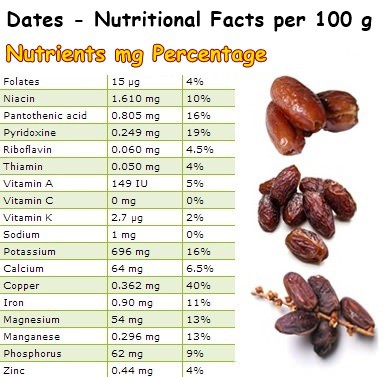These small, cylindrical, sweet fruits boast a wide range of impressive health benefits.
Dates (Phoenix dactylifera) help lower cholesterol, increase energy levels and maintain an overall good state of health.
Not only do they help prevent premature aging due to their high antioxidant content, but they are also said to ease labor. In addition to this, dates provide good amounts of B vitamins, copper, potassium, iron, phosphorus and magnesium, important nutrients with great positive effects on cardiovascular, muscle and digestive health and energy metabolism.
This sweet tropical delicacy is a healthy choice for any diet as a result of its impressive antimicrobial and anti-inflammatory properties as well as good nutritional value.
Dates are the sweet fruit of the date palm, a mighty tree native to the Middle East.
The date tree was widely spread throughout Mesopotamia and ancient Egypt, where its fruit were used to make date wine and palm wine or consumed fresh or dried.
Both the fruit and the (female) flowers can be eaten and the flowers are often cooked and incorporated into a variety of dishes. Popular dishes and products include date fruit and flower salads, date juice, wine and date syrup or desserts.

What do dates look like?
Ripe dates may range in color from bright yellow to red, whilst unripe dates are a light green color. Also, they may reach lengths of up to 6-7 cm and have an elongated, somewhat oval shape.
They grow in clusters, attached to frail-looking branches. They kind of remind me of dull-looking, slight more deflated and elongated mirabelles. On the inside, the flesh closest to the yellow skin is also yellow, while the rest all throughout the seed is glossy white.
Each fruit contains one glossy brown, elongated seed. Although dry dates are by far the most popular, there are also soft and semi-dry date varieties which enjoy great popularity as well and are equally nutritious. Dried dates have a rich, dark, caramel-brown color with reddish undertones and an inviting glossiness to them.
What do fresh dates taste like?
Dates can be eaten when they are yellow or red in color, even though they are not yet the dates we westerners are used to eating, or we can leave them on the kitchen counter until they start turning brownish and wrinkly which is when they become even riper and take on a more familiar taste. Fresh dates (those that are still yellow in color) have a somewhat astringent taste to them, some say slight bitterness, but also a pleasant sweet aftertaste, but with little persistence. Fresh dates also have a crisp texture, similar to that of apples or pears. The riper they get, the more flavorful they are. Some people like to put the not perfectly ripe fruits into the freezer for a day so they become softer.
What do dried dates taste like?
Dried dates are a more familiar taste to westerners with their soft, sticky texture and chewy flesh. They are distinctively sweet, sugary even, but different varieties may have different aromas. For example, some dates may have a nuttier aftertaste to them. I eat dried dates as a snack on their own when I crave something sweets or mix them with sour yogurt and chopped walnuts.
You might be interested :Can You Eat Raw Dates?

What are the benefits Of Dates?
First of all, the fruit promote normal growth and development due to their good B vitamin and mineral content. They are a particularly good source of vitamins B3, B5 and B6 and contain small amounts of vitamins B1, B2 and B9. B vitamins help with brain development, promote skin and digestive health and are directly involved in energy production. A deficiency is often indicative of digestive system problems and manifests as low energy levels and fatigue.
Fresh and dried dates contain naturally occurring sugars such as fructose and glucose, which are more concentrated in the dried fruits. If you have a constant crave for sweet foods, you can try replacing processed sweets with all-natural ones such as dates, figs and other fruits of your liking, fresh or dried. This way you will satisfy your sweet tooth and lower the risk for side effects associated with a high intake of refined sugar.
How to best eat dates
Dates and fruits in general are best consumed 1-2 hours before a meal and 2-3 hours after, as an independent meal of their own, or a snack in between meals. Eaten as such, they are believed to better help keep weight from fluctuating and within healthy limits. Eating a few dates will give you instant energy and help revitalize the body.

Dates contain around 8 g of fiber/100 g of fruit. Why is this important? Dietary fiber prevents too much LDL (bad) cholesterol from being absorbed at the intestinal level by binding to fats.
A diet providing moderate amounts of fiber is believed to indirectly protect against cardiovascular disease. In addition to this, fiber promotes regular bowel movements, regulating intestinal transit and preventing and relieving constipation naturally.
If left untreated, constipation can cause feelings of unwell and lead to and worsen hemorrhoids disease.
Relieving constipation is one of the most important steps in managing hemorrhoids symptoms and improving one’s quality of life. Last but not least, fiber-rich foods such as dates limit the exposure of our colon to waste, decreasing related health risks such as colon cancer, according to research.
Because they are rich in tannins, natural antioxidants found in plants, dates are believed to help limit free radical damage and prevent premature aging.
Also, dates are shown to have impressive antibacterial, anti-inflammatory and antihemorrhagic properties.
A study on ‘The effect of late pregnancy consumption of date fruit on labour and delivery‘ came to the conclusion that consuming dates in the last month of pregnancy can promote cervical dilatation and reduce the degree of membrane rupture, thus preventing possible bacterial infections that can harm the newborn.
Dates nutrition facts
A quick look at the nutritional table above will reveal the amounts of vitamins and minerals found in 100 g of dates. There are fairly good amounts of B vitamins: pyridoxine, pantothenic acid, niacin, riboflavin, thiamine and folic acid help increase energy levels and benefit digestion. Copper (40%) can prevent hair graying, among other more impressive effects. Iron (11%) is good for people suffering from anemia. Potassium (16%) counteracts the effects of a diet rich in sodium and helps lower blood pressure.
Also take a look at : Are Dates Acidic?
Dates are also a good source of magnesium (13%). The mineral maintains healthy muscles, heart included, prevents muscle twitches and cramps, feelings of ‘running ants’ in muscles and, at the same time, promotes bone health by directing calcium in bones and preventing it from being deposited in joints, heart valves or other unusual areas, which would increase the risk for atherosclerosis. Overall, dates remain a healthy food choice that can satisfy anyone’s craving for something sweet whilst meeting their nutritional demands.
